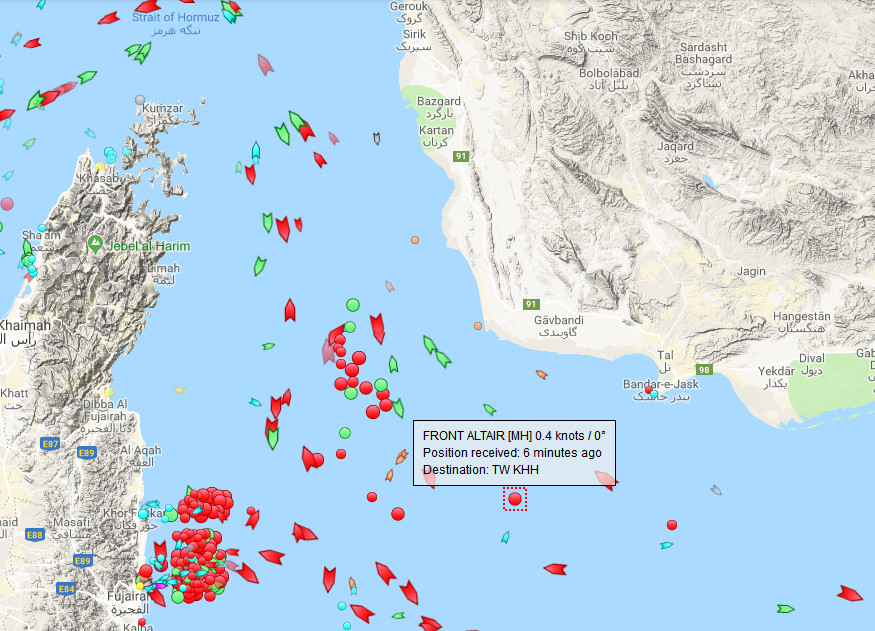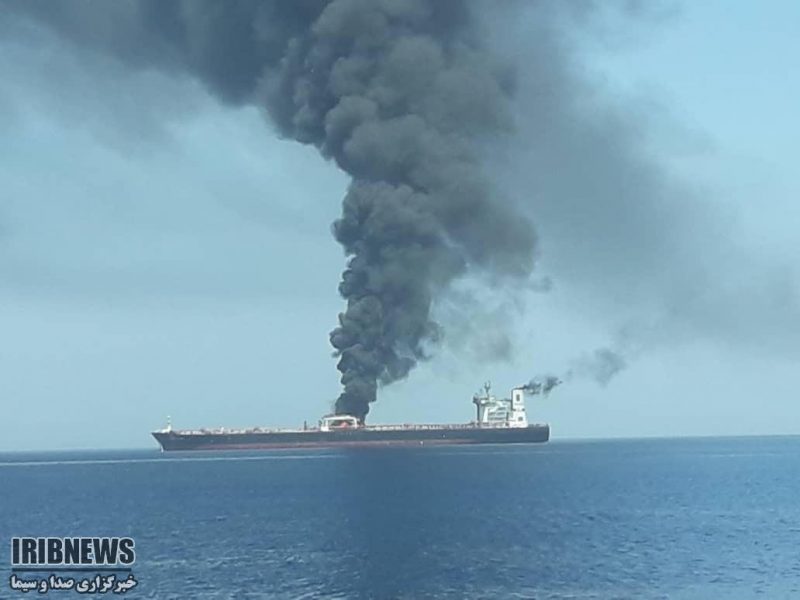Early this morning, around 6:00 UTC, two tankers in the Gulf of Oman were attacked by surface weapons. Both ships were some 50 kilometers south-east of Bandar-e Jask, Iran, and some 100+ kilometers east of Fujairah.

The Front Altair, a 250 meter long crude oil tanker under the flag of the Marshal Islands, came from the United Arab Emirates and was on was on its way to Taiwan. Its load of 75,000 tons of naphta caught fire and the crew had to abandon the ship.

The second attacked ship is the Kokuka Courageous, a 170 meter long tanker flagged by Panama. It was coming from Saudi Arabia and on its way to Singapore. The ship has its hull breached above the water line, but its load of methanol seems to be intact.
The Iranian Search and Rescue ship Naji picked up the 44 crews members of both ships and brought them to Bandar-E Jash. Oil prices increased by some 4%.
These attacks come a month after four ships anchoring near the UAE port Fujairah were damaged by explosives attached to their hulls. The investigation of that incident by the UAE did not blame anyone for the attack but suggested that a nation state must have been behind it. U.S. National Security Advisor John Bolton blamed Iran.
It is likely that Iranian proxy forces were involved in the May attacks. It seems unlikely that Iran had anything to do with today’s attacks.
The May attack was accompanied by two drone strikes launched by Houthi forces in Yemen on the Saudi east-west pipeline that allows some Saudi exports to avoid a passage through the Street of Hormuz. A third strike was a medium range missile launch by the Islamic Jihad in the Gaza stripagainst the city of Ashkelon in Israel.
All three strikes together were a warning that those countries who instigate for a U.S. war on Iran would get seriously hurt should Iran be attacked.
The attack today comes at an inconvenient time for Iran. The loud anti-Iran campaign John Bolton initiated in April and May recently calmed down.
U.S. President Trump tries to move Iran towards negotiations with him. He recently received the President of Switzerland in the White House. Switzerland is the ‘protecting power’ that represent U.S. diplomatic interests in Iran.
The German Foreign Minister Maas was send to Iran to press for Iranian concessions. Currently the Prime Minister of Japan Shinzo Abe is visiting Tehran. He today met Iran’s Supreme Leader, Ayatollah Khamenei but had no success in moving Iran towards negotiations with the Trump.
Even while Iran rejects negotiations with the U.S. as long as the U.S. keeps up its sanctions, it has no interest in disturbing the current phase of diplomacy. Iran seems to have nothing to win from these attacks.
Is someone else out to nearly literately torpedo the current mediation attempts?
Update (11:30 utc, 7:30 AM blog time):
A few tweets Iran’s Supreme Leader issued after his meeting with Prime Minister Abe today hint at a motive Iran might have to conduct something like the attack that happened today:
Khamenei.ir @khamenei_ir – 9:36 UTC – 13 Jun 2019
We do not believe at all that the U.S. is seeking genuine negotiations with Iran; because genuine negotiations would never come from a person like Trump. Genuineness is very rare among U.S. officials.
.@AbeShinzo U.S. president met & talked with you a few days ago, including about Iran. But after returning from Japan, he immediately imposed sanctions on Iran’s petrochemical industry. Is this a message of honesty? Does that show he is willing to hold genuine negotiations?
After the nuclear deal, the first one to immediately breach the JCPOA was Obama; the same person who had requested negotiations with Iran & had sent a mediator. This is our experience, & Mr. Abe, know that we won’t repeat the same experience.
The keyword here is “petrochemical”. The tankers hit today were loaded with naphta from the UAE and methanol from Saudi Arabia. Both are petrochemical products and not simply crude oil. Last Friday, June 7, the U.S. sanctioned all trade with Iran’s biggest petrochemical producer. These sanction will seriously hurt Iran.
When the Trump administration began to sanction Iran’s oil export last year, Iran announced new rules of the game. It said that it would retaliate against other Persian Gulf producers should Iran be unable to export its goods:
Iran has threatened to block the Strait of Hormuz, a vital artery for oil shipments from the Middle East. The warning comes in response to the US, which is trying to cut off Iranian crude exports.
…
Iran’s supreme leader’s senior adviser for international affairs, Ali Akbar Velayati said his country will retaliate.
“The most transparent, complete and prompt response was given by Mr [Hassan] Rouhani, the Iranian president, in his last trip to Europe. The response was clear: if Iran cannot export oil through the Persian Gulf, no-one will do this,” Velayati said, speaking at the Valdai discussion club in Russia. “Either everyone will export, or no-one,” he added.
Now we can apply the keyword Khamenei used today to these sentences: “if Iran cannot export petrochemical products through the Persian Gulf, no-one will do this”. “Either everyone will export, or no-one.”
That Iran might have this motive does not mean or prove that it is responsible for today’s attack. Risking to sink two foreign tankers in international water is not what an otherwise cautious Iran would typically do. Someone else might have initiated it to blame it.
Still – no matter if Iran was involved – what Khamenei said is a very serious message that Abe, who Trump sent to Iran, will understand and communicate back to the White House.
This article was originally published by “Moon Of Alabama“
The 21st Century
